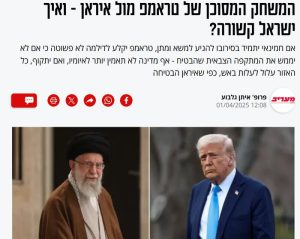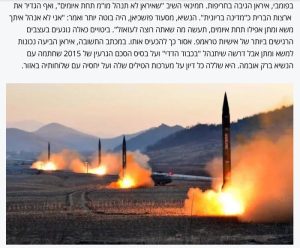PNN – The relationship between Iran and the United States, whether it leads to negotiations or tension, will have a serious impact on the Zionist regime, and this issue has occupied the minds of Zionist researchers.
According to the report of Pakistan News Network, citing Ma’ariv, Zionist professor Eitan Gilboa, an expert on US issues and senior researcher at the Begin-Sadat Center for Strategic Studies, wrote regarding the recent tensions between Iran and the US:
Donald Trump, the current President of the United States of America, has established a pattern of action and reaction in various international relations issues in his second term, which has reached a very sensitive and special point regarding the Iranian nuclear issue. The most prominent behavioral element in this Trump behavior pattern is his personality, which is a determining factor in managing his speech and actions. He is a forceful bully who likes to display and dictate to his opponents and friends in dramatic and unusual ways.
Read more:
Financial Times: Trump is the cause of the reversal of the process of “globalization”
He repeatedly uses threats to achieve his goals, warning that if the threatened party does not accept his orders, “the gates of hell will open” or “something very bad will happen to them.” He warns governments and regimes that refuse to accept his word that the American response will be the largest and most severe they have ever experienced.

This Zionist professor writes about his personality and behavior in the field of international affairs:
His demands are extreme. In fact, he likes to disrupt the existing politics and order and propose disruptive plans and solutions to complex problems that have plagued the international arena for decades. He has little patience, wants impressive achievements in the shortest possible time, and wants to be taken seriously. He uses the media to convey his threats and demands, repeating them in press conferences.
He wrote regarding Trump’s demand from Iran:
He wants the complete dismantling of Iran’s nuclear infrastructure, not even a minimal infrastructure that can serve Iran’s needs. This is a significant shift from the previous US position formulated by Presidents Obama and Biden. They only wanted to stop the growth and expansion of the nuclear program, but Trump wants to eliminate it.
Eitan Giblou writes regarding the verbal tensions that have developed between Tehran and Washington:
Against this backdrop, a dangerous ping-pong-like process of exchanging messages, threats, and actions between Washington and Tehran has developed in recent days.
Faced with Iran’s response, Trump escalated his aggressive statements and made clearer threats against Iran: If Iran does not agree, we will bomb it in a way it has never seen before. Iran responded in kind: Our missiles are ready, if you bomb, you will be hit hard.
The two sides also tried to send threatening messages to each other through practical actions, with Trump sending B-2 bombers to the region and Iran sending messages by unveiling another of its missile cities.

This Zionist professor finally noted, regarding the complex situation in which Trump finds himself:
Trump is now threatening, but he hopes that the Iranians will do what he wants and he will not have to carry out his military threats. Both sides are interested in negotiations, not military conflict. It is possible that their rhetoric and military preparations are intended as a prelude to opening the way for negotiations to begin. But the distance between the two is great, and they are walking a very thin rope that could break at any moment.
If Iran persists in its refusal to negotiate with Trump, Trump will be in a difficult dilemma, because if he does not carry out the military strike he promised, no country will take his threats seriously, and if he does launch a military strike, the entire region may catch fire, as Iran has promised.
It is doubtful whether American public opinion is ready for a new, major war in the region. The deep wounds of American society from military defeats in Afghanistan and Iraq have not yet healed.

